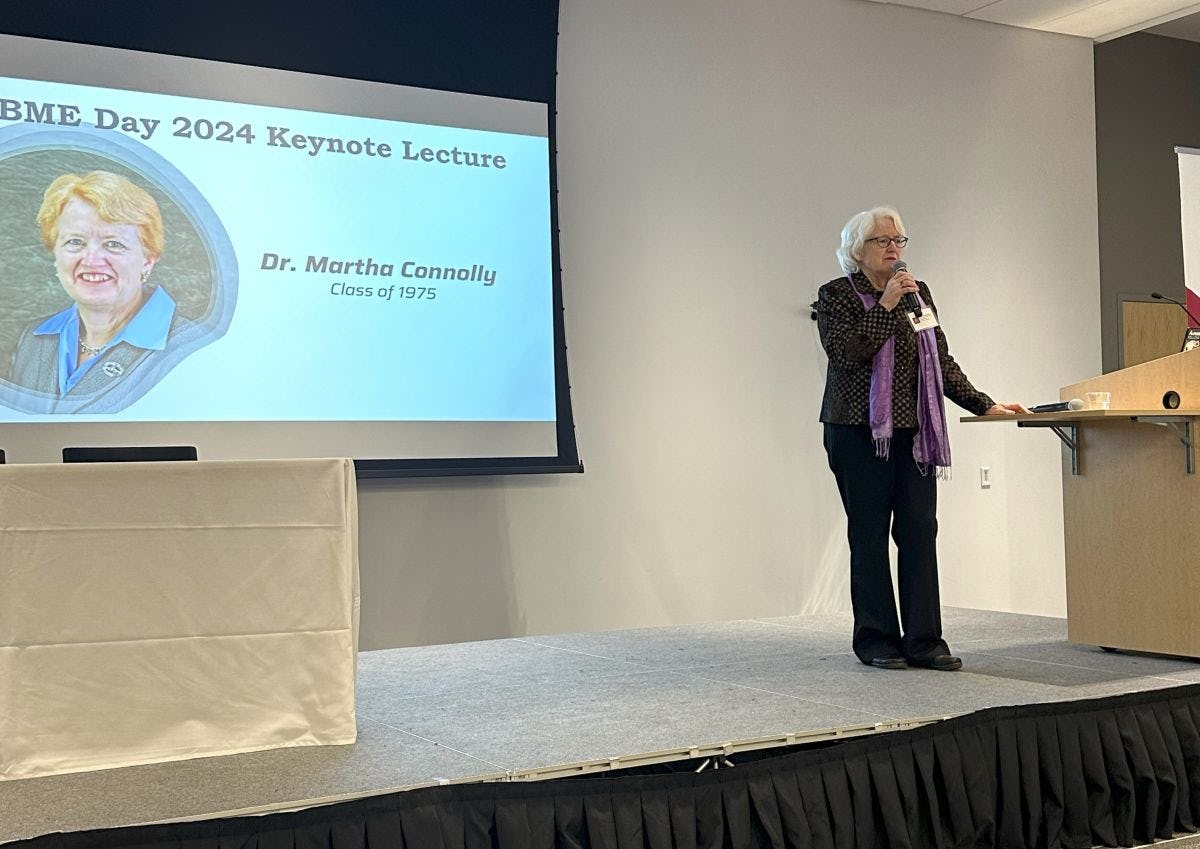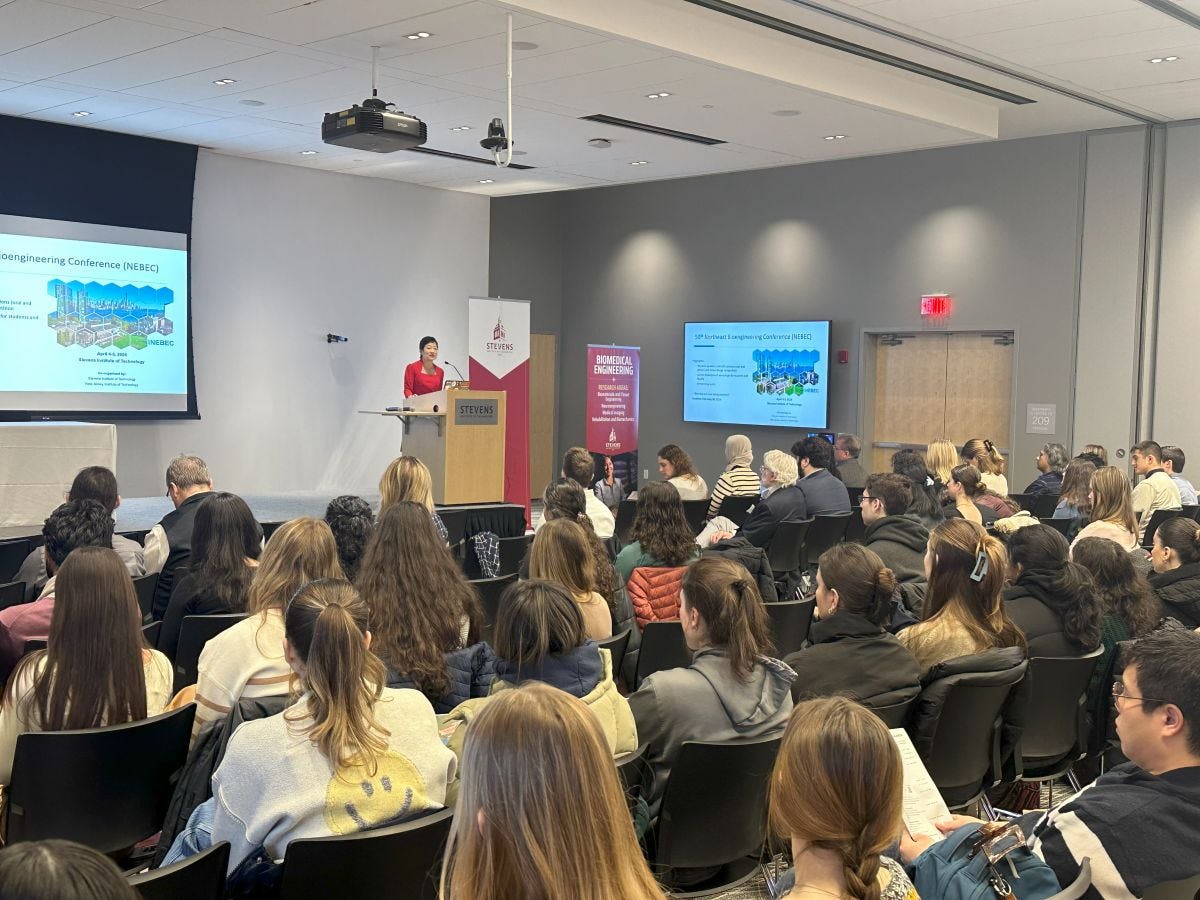Stevens Biomedical Engineering Day 2024 Spotlights How the Department’s Research Goes Beyond the Laboratory
In its second year, the gathering generated enthusiasm for translational research that’s helping to solve real-world clinical problems
Informative speeches, panel talks, and research poster presentations — this description may summarize what happened at the Second Annual Biomedical Engineering Day held on February 2, 2024, but the more essential takeaways were the intangible gains of the enthusiasm experienced by the nearly 200 attendees that filled the University Center Tech Flex Auditorium during this half-day event.
Jampacked with insights delivered by faculty and students from Stevens and other institutions, attendees got a firsthand view of how biomedical engineering research helps improve human health.
“Biomedical engineering is the merging of medicine, technology, engineering, and physiology, all into one discipline, focused on improving our quality of life,” said Jennifer Kang-Mieler, Stevens biomedical engineering department chair. “It is the backbone of our healthcare system, and if you look at the research within the Stevens Department of Biomedical Engineering, we are solving real-world clinical problems.”
After welcoming remarks, Kang-Mieler introduced the keynote speaker, Martha Connolly ’75, a past director of the Maryland Technology Enterprise Institute at the A. James Clark School of Engineering at the University of Maryland. Connolly holds bachelor’s and master’s degrees in chemistry from Stevens Institute of Technology and a Ph.D. in biomedical engineering from Johns Hopkins University.
Then, the agenda turned to a segment titled “Get to Know Biomedical Engineering,” moderated by Stevens biomedical engineering faculty, including Assistant Professor Jinho Kim and Professor and Associate Chair of Graduate Studies Xiaojun Yu. The segment showcased faculty research and Stevens researchers' unique and fun personal interests through video montages, from cooking to martial arts.
“We wanted to show the students in attendance that we're just more than professors and that we have other interests outside of our scientific worlds,” Kang-Mieler explained.
The spotlight then turned to the Senior Design Pitch Competition, moderated by Stevens biomedical engineering faculty, including Associate Professor Carrie Perlman and Teaching Associate Professor Peter Popolo. Ninety seconds — that’s the time each of the participating nine teams had to present a big-picture overview of their capstone projects focused on solving a real-world problem in a way that the audience could understand and appreciate.
Three panel sessions presented insights from experts in biomedical engineering and other engineering disciplines.
The first panel, “Bioethics,” was moderated by Stevens biomedical engineering faculty, including Assistant Professors Antonia Zaferiou and George McConnell. Panelists included Stevens School of Humanities, Arts and Social Sciences Assistant Professor Amber Benezra and Associate Teaching Professor and Associate Chair of Undergraduate Studies Sally Shady, as well Frank Castello, Clinical Associate Professor at Rutgers Robert Wood Johnson Medical School.
The “Artificial Intelligence (AI) and Biomedical Engineering Healthcare” panel was moderated by Stevens biomedical engineering faculty Assistant Professor Raviraj Nataraj and Professor Hongjun Wang. Panelists included Xin Qi of Eisai, Inc.; Stevens mechanical engineering Associate Professor and Director of the Stevens Institute for Artificial Intelligence Brendan Englot; and Stevens Bbomedical engineering Assistant Professor Yu Gan.
Stevens alumni returning to campus, including George Blazeski '10 and Mohammad Mir '23, joined keynote speaker Connolly in the “Life after Biomedical Engineering Degree” panel, moderated by Stevens biomedical engineering faculty Becky Tucci, lecturer, and Shang Wang, assistant professor. Drew Carlson, former Program Director of the Division of Cardiovascular Sciences at the National Institutes of Health, was also a panelist.
After a networking lunch and senior design poster viewing, the event concluded with a resume workshop for students.
Spreading the biomedical engineering message, bringing research into real-world clinical practice
The Steven biomedical engineering community is committed to transforming patient care, aiming for longer, healthier lives through groundbreaking research and technological advancements in healthcare.
“This intimate bond between medicine and biomedical engineering drives our translational work, moving beyond theory to practical application in clinics,” said Kang-Mieler.
Stevens actively involves students, including undergraduates, in this mission.
“By working in our labs, students gain hands-on experience and contribute to solving real-world clinical problems,” she added.
This hands-on approach enhances learning and fosters innovation. The department is also committed to promoting diversity in the field.
Kang-Mieler recalls that as an undergraduate and master's graduate student in mathematics, she was the only female student, and female faculty representation was scarce.
“We are making a good effort to recruit talented female students and provide opportunities for them to grow,” she said. “If you look at our student population, as well as our faculty, we were not 50/50, but we're close, as 35%-40% of our student population are female students,” said Kang-Mieler, who points out that biomedical engineering is doing better than other science and engineering disciplines. “But we need to do better,” she said.
“I want to create a community where we can come together to exchange ideas and learn from each other. It's not something that can be done overnight, but we certainly are moving in that direction,” she said, noting the launch of an academic partnership with Hackensack Medical School.
The Stevens Department of Biomedical Engineering is on a growth trajectory. It received new research awards that were more than double from fiscal year 2022 to 2023. The department will also host the 50th Northeast Bioengineering Conference (NEBEC) from April 4-5, 2024. NEBEC stimulates collaboration and promotes biomedical engineering research and education programs in the northeast U.S.
“I'm very excited about this event… It is an opportunity for students and early-stage faculty to learn more about biomedical engineering and Stevens,” she said.




